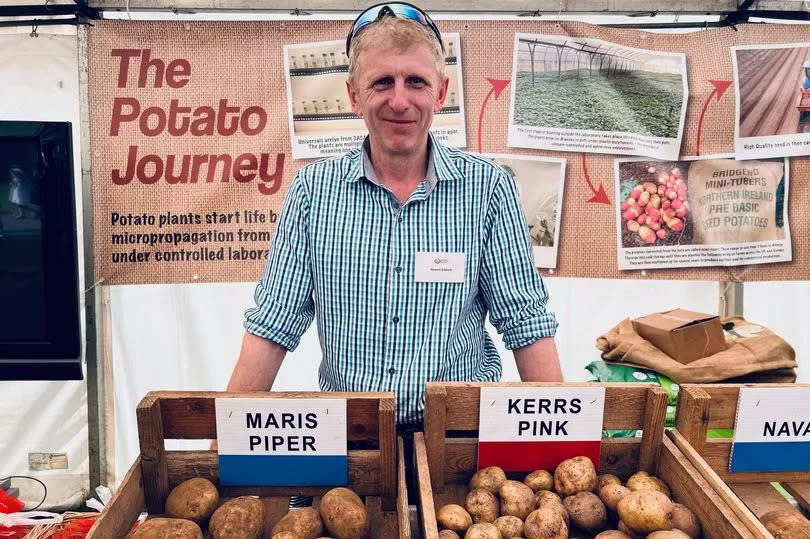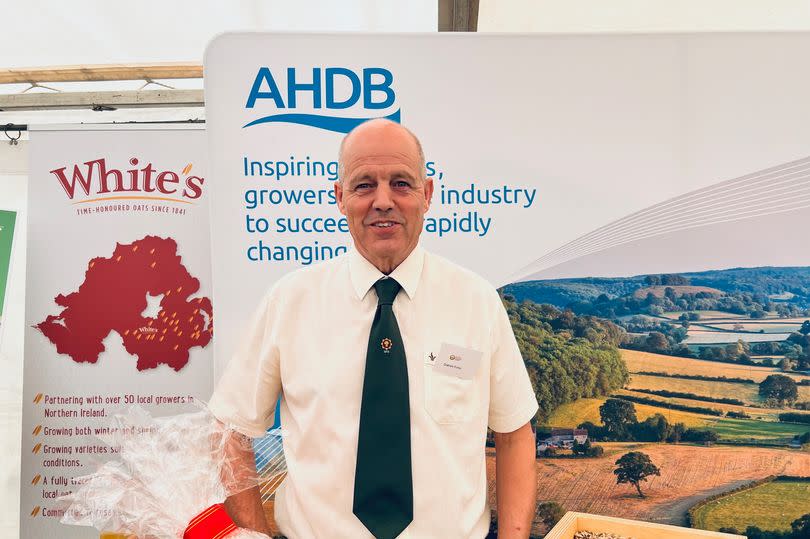Northern Ireland potato shortage in June will hit chip prices, warns farmer

Ten months of wet-weather that left farmers unable to reap autumn crops or sow in soggy spring fields have had a major impact on Northern Ireland crop growing.
While the recent sunshine allowed them to get their seeds in the ground, chippy fans are in for price hikes because of a shortage of potatoes.
We spoke to three farmers at the Balmoral Show about the challenges they've faced because of heavier rains climate scientists warned would hit the island of Ireland.
Read more: NI fruit, veg and spud crops at risk after months of rain
Potato farmer Robert Sibbett, said: "It has been very bad. We only started planting last week and normally we would be finished. They are coming through now the heat is here and it's growing, but it's late.
"The last five, maybe six seasons, I haven't had a good growing season. It's either went from too dry to too wet - there has never been a complete season. You just can't get the work done."
Robert said a lot of farmers never got their potatoes dug in autumn, which will have an impact on availability.
But he added: "The real shortage mightn't kick in until June time. The chip prices will go up more than the supermarkets."
That's because potatoes are sold on the open market to chip shops while supermarkets contract farmers at a certain price.

"Last summer chips were at £1,000 a tonne - this year I think it will be similar," he added.
While the farmers are now hopeful "things will turn out for the best" - we heard "the wet weather is definitely far more extreme now than it used to be".
John McAlister from McAlisters Apples is the fourth generation of his family to farm their Loughgall orchard where they are developing their own brand of apple juices - Juist - to cut waste.
He said: "It has been dreadful. It's been a long wet winter. Apples need a hard frosty winter to close the buds, kill the germs and slow everything down [but] it's been a damp winter so all your pests are growing and there has been nothing there to kill them.
"Then it was such a wet spring. You are looking to get out on to the orchards, starting to get a bit of work done, maintain the trees and it was just impossible with the weather.
"We're starting to catch up. The last three weeks has been very good and it's amazing how well the ground has dried. We did have a few nights frost which did cut the crop back but it's too early to see."
John said storms, hailstones and extreme weather can also hit their crop if blooms are lost from the trees. He added: "Our climate is changing. We are becoming more European like I suppose - more extremes.
"This wee country used to be cold but not very cold, warm but not very warm. Apples thrive at the start but then slow down with a lack of water. We could have the same again.

"We are going to have more dramatic weather... you just have to adapt to it... and modernise to suit the climate.
"Price is the big thing now - the retail sector has pushed us to the floor and sustainability hasn't been there."
Grain farmer, Graham Fury, is hopeful "things will turn out for the best" after recent sunshine but said "the wet weather is definitely far more extreme now than it used to be".
He added: "It used to be nice warm showers and now you get an absolute deluge of rain and five miles up the road you've got nothing.
"It definitely has changed but farmers are very adaptable. If you look at last year and the wet weather and the year before, which was the really hot weather and people thought this was going to be the norm - 2023 was the complete opposite virtually.

"How do you advise a guy from 2022 when you are going to have to look at drought resistant plants to irrigation and all these things because it it's going to be dry summers and wet winters and then it turned on its head last year.
"You have to adapt and farming has always done that on a yearly basis.
In terms of the climate crisis, he added: "People are blaming farmers - but what about the aircraft and people flying on three holidays a year.. driving their big motors and taking their kids to school in big SUVs.
"We have accepted that we are part of the problem but we are also part of the solution. We just need other people to say they are part of the problem and the solution as well."
For all the latest news, visit the Belfast Live homepage here and sign up to our daily newsletter here.

 Yahoo News
Yahoo News 
